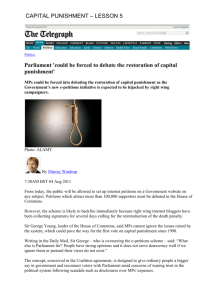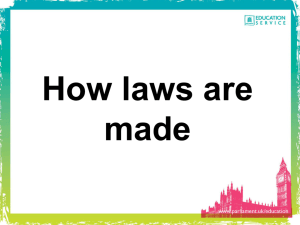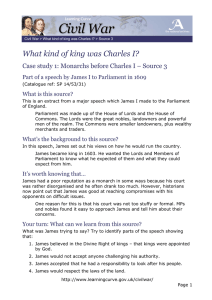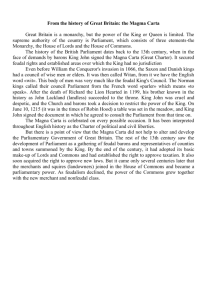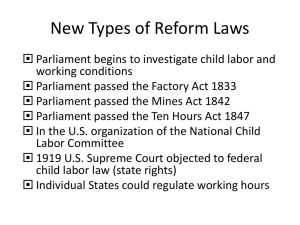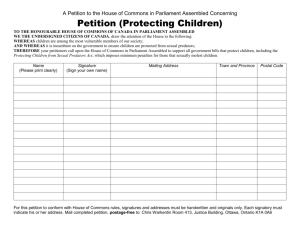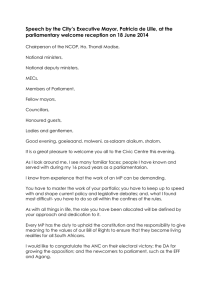Research on UK Parliament’s Origin and Institution Maggie Lee 23
advertisement
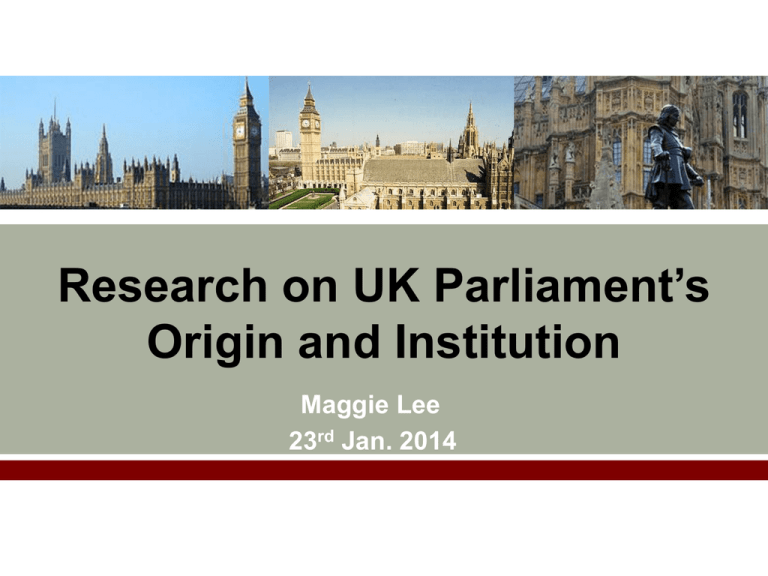
Research on UK Parliament’s Origin and Institution Maggie Lee 23rd Jan. 2014 The Role of Parliament The Role of Parliament Holding the government to account Scrutinise what departments are doing and how they are spending public money. They do this by asking questions in the House of Commons and working on committees which run investigations and make recommendations to the government Making and amending laws Most of the draft laws going through Parliament (called ‘bills’) will be government bills but everyone in Parliament can debate about them and vote on them Main Roles of Parliament Representing UK Citizens All MPs are voted for and it is their job to support and represent their citizens. You can contact your MP no matter what your age. MPs will often help with issues that people may not be able to get their local council to help with MPs Party Conservative Labour Liberal Democrat Democratic Unionist Scottish National Independent Sinn Fein Plaid Cymru Social Democratic & Labour Party Alliance Green Respect Speaker Total number of seats Seats 303 257 56 8 6 5 5 3 3 1 1 1 1 650 CONTENT Structures and Dependence in Parliamentary Development Parliamentary Supremacy and Role of NPC Future of Parliament Enlightenment Structures and Dependence in Parliamentary Development Origin Depended on the Throne Development Relying on the Class Struggles and Religion Conflicts The Centrality of Authority Relying on the Parliament’s Own Reforms Origin Depended on the Throne Birth of the UK Parliament It developed naturally out of the daily political needs of the English King and his government. The first known official use of the term Parliament was in 1236. The word Parliament means an event arranged to talk and discuss things, from the French word "parler" Origin Depended on the Throne Changes under Edward I Edward I made the meeting of Parliament a more frequent event and over the course of his reign of 35 years (1272-1307) he summoned it on 46 occasions The Origin Depended on the Throne Medieval Parliament Medieval Parliament as a royal palace, playing an important role in royal life through the centuries The Development Relying on the Class Struggles and Religion Conflicts The Conflict between the King and the Parliament The reign of Charles I, beginning in 1625, deteriorated into civil war and regicide. But the republic set up in his place was ousted by military rule under Oliver Cromwell. The 20 years from 1640 to 1660 probably saw the most radical changes ever in the membership, duties and nature of the upper house The Development Relying on the Class Struggles and Religion Conflicts Religious Conflict Glorious Revolution: The conflict between Catholics and Protestants; In 1688 the King was forced to flee London. After ‘Glorious Revolution’, Whigs and Tories draw up the bill of right The Development Relying on the Class Struggles and Religion Conflicts Marxist interpretations: the events of the English Revolution as a class war, with the merchant and commercial classes supporting Parliamentary liberty and giving rise to a new Parliamentary class linked to protestant economic expansion The Centrality of Authority Relying on the Parliament’s Own Reforms The Reform Acts and representative democracy House of Commons: From the 18th century onwards, the social changes brought about by industrial growth and the decline of agriculture meant that the demographic landscape of Britain was altered. With these changes came demands from the working and middle classes for equality and fairness. It took many years for a more representative Parliament to be achieved The Centre of Authority Relying on the Parliament’s Own Reforms Reform of the House of Lords The House of Lords has existed since the middle ages but its composition and powers have gradually evolved 1911, Parliament Act, replaced House of Lords veto over legislation with the power to delay passage of Bills by two years 1949, Second Parliament Act, reduced House of Lords delaying power to one year Parliamentary Supremacy and Role of NPC Legislation Scrutiny Debates Legislation Legislation: Start in House of Commons 1 First Reading It is the first stage of a Bill’s passage through the House of Commons - usually a formality, it takes place without debate, The short title of the Bill is read out and is followed by an order for the Bill to be printed 2 Second Reading It is the first opportunity for MPs to debate the main principles of the Bill. The Government minister, spokesperson or MP responsible for the Bill opens the debate. The official Opposition spokesperson responds with their views. The Commons decides whether the Bill should be given its second reading by voting Legislation: Start in House of Commons 3 Committee stage (Commons) Line by line examination of the Bill. Most Bills are dealt with in a Public Bill Committee. Amendments for discussion are selected by the chairman and only members can vote on. A minority of Bills are dealt with by a Committee of the Whole House. Consolidated Fund Bills do not have a committee stage at all 4 Report stage (Commons) Chance for the whole House to discuss and amend the Bill. All MPs may speak and vote, the debates may be spread over several days. All MPs can suggest amendments to the Bill or new clauses (parts) they think should be added Legislation: Start in House of Commons 5 Third reading (Commons) Debate on the Bill is usually short, and limited to what is actually in the Bill. Amendments cannot be made at third reading. At the end of the debate, the House votes on whether to approve the third reading of the Bill 6 'Ping Pong' Ping-pong refers to the to and fro of amendments to Bills between the House of Commons and the House of Lord. In the end, Both Houses must agree on the exact wording of the Bill Legislation: Start in House of Commons Case Study----Ping Pong In 2005, the final stages of the Prevention of Terrorism Bill are good example. The Commons sat from 11.30 a.m. on Thursday 25 March until nearly eight o’clock in the evening of Friday 26 March, and during that time the Bill went back and forth between the Houses seven times with proposals and counterproposals being considered each time. The Lords finally gave in Bill Scrutiny Scrutiny has become more and more prominent in the work of Parliament in the last half-century Scrutiny 1 Questions ‘Question Time’ is an opportunity for MPs and Peers to question government ministers about matters for which they are responsible: Oral Questions Written Questions(Answers) Prime Minister's Question Time Scrutiny 2 Vote(Motion) of No Confidence A parliamentary vote which when passed would demonstrate that the elected parliament no longer has confidence in the appointed government. "No Confidence" leads to compulsory resignation of the council of ministers or dissolution of Parliament Scrutiny 3 Select Committees There is a Commons Select Committee for each government department, examining three aspects: spending, policies and administration. These departmental committees have a minimum of 11 members. Findings are reported to the Commons. The government usually has 60 days to reply to the committee's recommendations Scrutiny 4 Pre-appointment hearings Hearings enable select committees to take evidence from candidates for certain, key public appointments before they are appointed Hearings are in public and involve the select committee taking evidence from the candidate and publishing a report setting out the committee’s views on the candidate’s suitability for the post Hearings are non-binding Hearings have been introduced on a pilot basis Debates 1 Conception and Role Debates are an opportunity for MPs and Lords to discuss government policy, proposed new laws and current issues. Debates are designed to assist MPs and Lords to reach an informed decision on a subject. This decision is then often expressed in a vote (called a 'division'), for or against Debates 2 Rules During a debate, the speaker calls MPs in turn to give their opinion on an issue. MPs must get the Speaker’s attention(called ‘catching the Speaker’s eyes’) and usually stand, or half-rise from their seat. They may also write in advance to indicate their wish to speak MPs address their speeches to the Speaker. Normally MPs will speak only once and must observe the courtesies of debate. There are certain conventions MPs must follow, like ‘Will the honourable Member… ’ Debates 3 Case Study MPs debated a motion on Syria crisis and military action in the House of Commons on Thursday 29 August 2013. Prime Minister, David Cameron, opened the debate. Leader of the Opposition, Ed Miliband, responded on behalf of the Official Opposition The House of Commons voted against the Government motion on Syria by 285 votes to 272 (division 70) How NPC Running? The National People's Congress (NPC) is the national legislature of the People’s Republic of China NPC Seats 2,987 How NPC Running? Scrutiny of NPC 1 Deliberation over Work Reports of People’s Governments, People’s Courts and People’s Procuratorates 2 Examination and Approval of Final Accounts; Deliberation over Reports on Implementation of the Plans for National Economic and Social Development and the Budgets, Reports on the Work of Auditing 3 Inspection of the Enforcement of Laws and Regulations How NPC Running? Scrutiny of NPC 4 Keeping on File and Reviewing of Regulatory Documents 5 Questioning and Addressing Inquiries 6 Investigation into Special Issues 7 Deliberation and Decision on Proposals for Removal from Office How NPC Running? Legislative Procedures 1 Getting onto the agenda 2 Deliberation of Bills 3 Passage and Publication Future of Parliament General Introduction of the Parliament Reform since 1950s Next Possible Steps of Reform General Introduction of the Parliament Reform since 1950s 1958, Life Peerages Act 1963, Peerages Act 1978, Radio broadcasts of House of Commons became permanent 1979, Reform of Select Committee system in House of Commons 1986, Televised coverage of House of Lords became permanent General Introduction of the Parliament Reform since 1950s 1989, Televised coverage of House of Commons became permanent 1999, House of Lords Act, reduced the number of hereditary peers in the House of Lords to 92, pending further reform 2002, Changes to hours of sitting of House of Commons 2005, The Constitutional Reform Act, created a separate Supreme Court and the Lord Chief Justice replaced the Lord Chancellor General Introduction of the Parliament Reform since 1950s 2010, Reduction of government influence over select committee membership; New Backbench Business Committee increases backbench influence over parliamentary timetable 2011, New Public Reading Stage introduced for Bills; Reformed ‘e-petitions’ system gives citizens the chance to raise topics for debate Next Possible Steps of Reform 1 To Curb the expansion of the power of the Executive- separation of powers Problem the executive and legislature are fused. The Prime Minister and ministers are MPs (has a large majority of seats). The executive is therefore present at the heart of Parliament Solution A Enhance the scrutiny of delegated legislation. Backbench Business Committee can completely control the agenda of the legislation Next Possible Steps of Reform 1 To curb the expansion of the power of the Executive- separation of powers B The Commons, rather than the Prime Minister, decide on the dissolution of parliament and the timing of general elections C Most of the leaders of Select committees could be from opposition parties. Enhance the power of scrutiny of shadow government Next Possible Steps of Reform 2 To enhance the scrutiny of society Problem MPs are usually responsible for the party, instead of the constituency Solution A put ‘Public Reading’ into a law B the constituency has the right to vote on whether remove their elected MPs from their posts C Emphasize the scrutiny of public media, like ‘The expenses scandal’ Next Possible Steps of Reform Case Study: The expenses scandal the 2000 Freedom of Information Act (FOIA) came into full force in 2005, campaigners and journalists had sought to obtain details of parliamentary expenses claimed by senior politicians Early revelations: the Home Secretary, Jacqui Smith, ranked homes in order to maximize the financial benefits In May 2009 the Daily Telegraph began to publish the full details. MPs had been able to claim back the cost of the most mundane domestic items The greatest damage caused by the expenses scandal related to parliament itself. The speaker of Commons was forced to resign and several ministers resigned from the government Next Possible Steps of Reform 3 To reform of the voting system of the House of Commons ‘Parliamentary Voting System and Constituencies Act 2011’ the Act resulted in introducing the Alternative Vote system for the UK Parliament and reduce the number of Members of Parliament from 650 to 600, the result of alternative vote referendum 2011 is worrying, 68 percent voted No and only 32 percent voted Yes. So the future of the reform is definitely gloomy Next Possible Steps of Reform 4 To carry on the further reform of the House of Lords To An Elected Second Chamber: wholly elected or an 80% elected chamber? Number of members: 250-300 ? Voting System: First Past The Post, Alternative Vote, Single Transferable Vote (STV) ? Tenure: a single, non-renewable term of 12-15 years? Enlightenment How to represent the people or constituents effectively Enlightenment How to check on the government efficiently How to make law in a more rational way How to reconnecting Parliament and the public Conclusion ‘Government of the people, by the people, for the people’ ‘Ask not what your country can do for you, ask what you can do for your country’ THANKS
